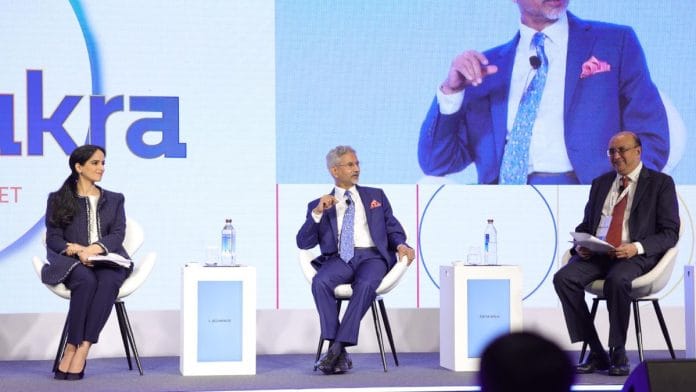New Delhi: The virtues of the “old order” are “exaggerated” said Indian External Affairs Minister (EAM) S. Jaishankar Tuesday, adding that it turned Pakistan’s 1947 “invasion” of Kashmir into a dispute between two countries, putting the “attacker and victim on par”.
“The old [global] order is a product of its time. But why I felt that its virtues were exaggerated was…the rule maker and the rule taker had somewhat different perspectives,” said Jaishankar, while speaking on the second day of the Raisina Dialogue in New Delhi. “If you were at the receiving end of some of those rules or the application of those rules, you had issues.”
“If it suits your interest, somebody is good, not good, or well I will make up my mind and you apply that order in the same country, to the same issues differently,” he added, giving the example of the Taliban.
“Think Afghanistan, the same Taliban, which was an outlier, was welcomed in the Doha process, was welcomed in Oslo, people were apparently okay with it. Today they are going back and saying that the Taliban is doing not-so-good things…When it suits you to deal with the Taliban, it is okay, when it is not, it’s not okay.”
.@DrSJaishankar: Just as we need order domestically, we need it internationally. Disorder benefits those willing to take risks, as seen in our neighbourhood. The old order, shaped by its time, had exaggerated virtues—#rule-makers and rule-takers saw it differently, with rules… pic.twitter.com/aDcftR3qqd
— Raisina Dialogue (@raisinadialogue) March 18, 2025
Jaishankar further added that on the issue of Kashmir, in 1947, when India took it to the United Nations after Pakistan invaded the territory, the powers at the time, turned into a “dispute” between New Delhi and Islamabad.
“The longest-standing illegal occupation of a territory pertains to India, what we saw in Kashmir. We went to the UN. What was an invasion, was made into a dispute. The attacker and the victim were put on par. Who were the culpable parties? The UK, Canada, Belgium, Australia and the US,” said Jaishankar.
Jaishankar’s comments were made during a panel discussion titled ‘Thrones and Thorns: Defending the Integrity of Nations,’ which also saw the participation of former prime minister of Sweden Carl Bildt, the Foreign Minister of Liechtenstein Dominique Hasler, Slovakian Foreign Minister Juraj Blanár, and Fiker Institute founder Dubai Abulhoul. It was moderated by Ashok Malik, partner at the Asia Group.
Also Read: As Raisina Dialogue kicks off, Jaishankar says no place for old assumptions in changing world order
Push for UN reform
One of the key pillars of the modern international system is the UN – which is an important forum to resolve disputes and enforce international law. Hasler called for the veto powers in the UN Security Council (UNSC) to be reformed, saying that they were not being used in line with the charter of the organisation.
Jaishankar, agreed with Hasler on the need for a strong UN, but added that it also has to be a “fair” forum, which allows for consistency when it comes to the application of norms in the global order.
“When the West goes out into other countries, it is apparently in pursuance of democratic principles. When other countries come into the West, it seems to have a very malign interest…I think we must have fairness,” said Jaishankar.
Former Swedish PM Bildt highlighted the need for the international order, with context to the war in Ukraine.
Russian President Vladimir Putin in February 2022 launched a “special military operation” in Ukraine, which has led to open warfare between the two neighbours over the last three years. India has maintained its ties with Moscow, while calling for peace between the two countries.
In fact, India’s economic engagement with Russia has grown in the last three years, especially due to its increasing imports of oil from Moscow—a fact which has irritated the European countries. For Europe, the invasion of Ukraine has put into focus their own security.
Bildt, pointed out that 141 countries in the United Nations voted to deplore Russia’s war in Ukraine, a vote that India abstained from. New Delhi has called on both Russia and Ukraine to pursue a lasting peace to the war, with Prime Minister Narendra Modi visiting Moscow last July, followed by a visit to Kyiv in August 2024.
The former Swedish leader, however, warned against any attempts to redraw borders today, saying that “all borders are artificial lines drawn on maps with the lines of blood”.
(Edited by Sanya Mathur)
Also Read: US concerned about ‘persecution & killing of religious minorities’ in Bangladesh, says Tulsi Gabbard






